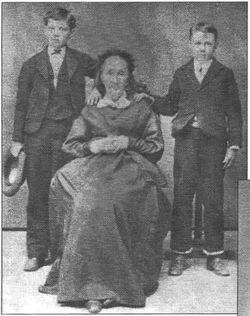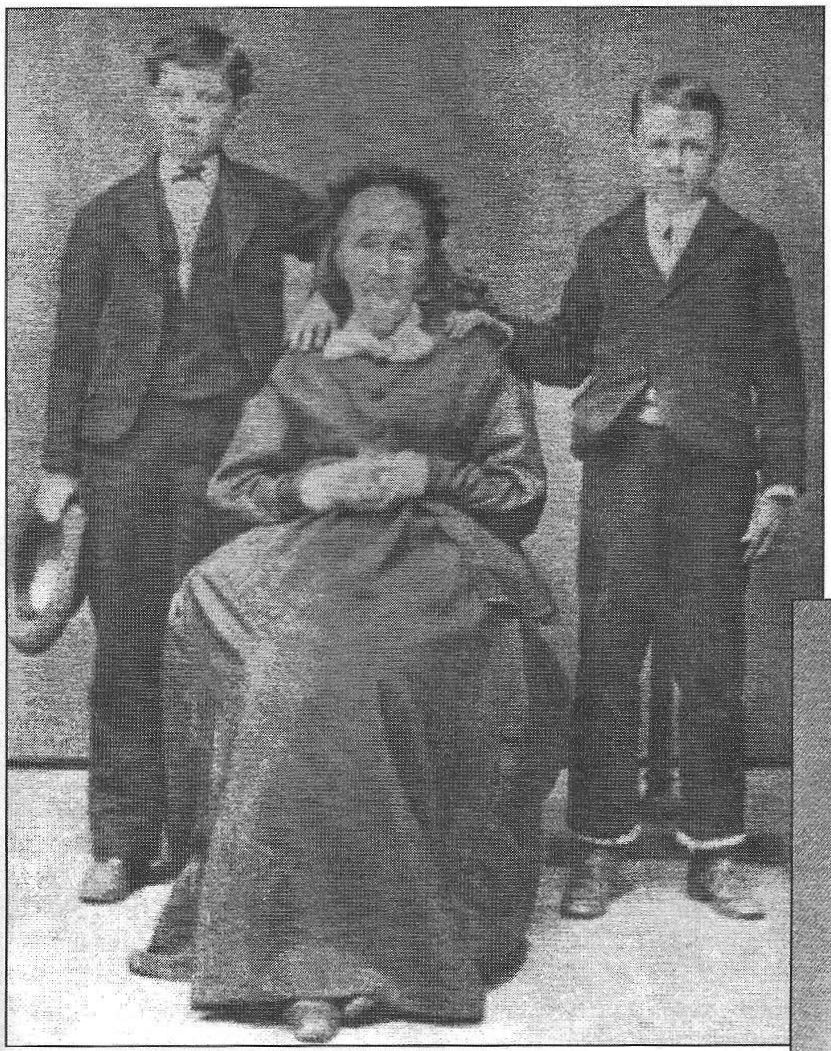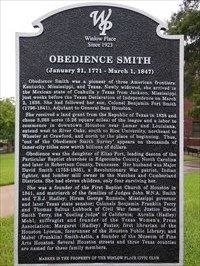CYNTHIA LESCALLEET/The Examiner
Author Audrey Barrett Cook has been determined to get Obedience Smith's role in early Houston acknowledged with an historical marker.
Marking her territory: Obedience Smith was here
Related Content
Leaving her mark
Here’s how the text of the historical marker reads:
OBEDIENCE SMITH
(January 21, 1771 - March 1, 1847)
Obedience Smith was a pioneer of three American frontiers: Kentucky, Mississippi, and Texas. Newly widowed, she arrived in the Mexican state of Coahuila y Texas from Jackson, Mississippi, just weeks before the Texas Declaration of Independence on March 2, 1836. She had followed her son, Colonel Benjamin Fort Smith (1796-1841), Adjutant to General Sam Houston.
She received a land grant from the Republic of Texas in 1838 and chose 3,368 acres (5.26 square miles) of the league and a labor to commence in downtown Houston near Lamar and Louisiana, extend west to River Oaks, south to Rice University, northeast to Wheeler at Crawford, and north to the place of beginning. Thus, "out of the Obedience Smith Survey" appears on thousands of inner-city titles now worth billions of dollars.
Obedience was the daughter of Elias Fort, leading deacon of the Particular Baptist churches in Edgecombe County, North Carolina and later in Robertson County, Tennessee. Her husband was Major David Smith (1753-1835), a Revolutionary War patriot, Indian fighter, and lumber mill owner in the Natchez and Cumberland Districts. She had eleven children, only four surviving her.
She was a founder of the First Baptist Church of Houston in 1841, and matriarch of the families of Judges John W.N.A. Smith and T.B.J. Hadley; Hiram George Runnels, Mississippi governor and later Texas state senator; Colonels Benjamin Franklin Terry and Thomas Saltus Lubbock of Civil War fame; Justice David Smith Terry, the "dueling judge" of California; Aurelia (Hadley) Mohl, suffragist and founder of the Texas Women's Press Association; Margaret (Hadley) Foster, first librarian of the Houston Lyceum, forerunner of the Houston Public Library; and Mabel (Franklin) Smith-Astin, a founder of the Museum of Fine Arts Houston. Several Houston streets and three Texas counties are named for these family members.
The reverse of the marker reads:
Erected in 2011 A.D. by the Winlow Place Civic Club
in honor of its formation on July 21, 1965, and the
founding of the Winlow Place Addition in 1923.
Written by Audrey Barrett Cook, Historian.
.
Posted: Tuesday, August 23, 2011 12:19 pm | Updated: 12:23 pm, Tue Aug 23, 2011.
Cynthia Lescalleet
The Examiner
Just in time for Houston’s 175th anniversary, Obedience Smith, a gutsy early settler of what would become Houston, is about to get some attention, historically speaking.
A newly minted marker recounting and honoring her rather remarkable life will be dedicated at a ceremony to be held at 10 a.m. on Sept. 10 in the auditorium of Lanier Middle School. Following that ceremony, the marker will be unveiled at its location on campus at the corner of Harold and Woodhead streets.
The site, in the Winlow Place subdivision, is in the midst of the 5.26-square-mile land grant Smith received from the Republic of Texas in 1838.
Today, Smith’s land grant covers areas known as Montrose and Southampton, Westmoreland and Mandell Place, Broad Acres and Shadowlawn, as well as pieces of River Oaks, the Museum District and midtown. Property transactions continue to carry her name in the title search.
Author and historian Audrey Barrett Cook of Winlow Place led the historical marker project as a fitting spin-off of her research for the biography she penned: “Obedience Smith (1771-1847), Pioneer of Three American Frontiers, Her Ancestors and Descendants.”
Cook, who has spent 20 years looking at various aspects of Smith’s life and legacy, said the dedication of the privately funded historical marker could not be better timed. Both Houston and the Republic of Texas have hit the 175th anniversary milestone.
By locating the marker at the middle school, it also will serve as a teaching tool, Cook said. (Seventh grade curriculum encompasses Texas history.)
history Snapshot
According to Cook’s research, Smith arrived in Texas just in time for the Runaway Scrape and the Texas Declaration of Independence from Mexico. She had followed one of her sons, who subsequently fought in the Battle of San Jacinto and later helped found the city of Houston.
Obedience Smith was later a founding member of the First Baptist Church of Houston in 1841. Her matriarchal connections link her to the families of many political leaders in several states, the co-founder of Terry’s Texas Rangers in the Civil War, and early local community contributors to the Suffragist movement, the Houston Lyceum (which was the forerunner of the public library), and Museum of Fine Arts, Houston.
Cook is not related to Smith. It was the author’s research on the history of the 13-block Winlow Place subdivision in 1990 for its 65th anniversary that eventually led her to write the biography, released in 2009, and to seek a permanent record of Smith’s legacy.
All that research is now fueling Cook’s next project, a biography of Smith’s son, Col. Benjamin Fort Smith. She called him another early player in Houston and in Texas whose role is not well-known but should be.
Cook said of her research and writing subjects, “I’m always for the underdog.”
Winlow Place Civic Club funded the historical marker honoring Obedience Smith.
Harris County Historical Commission has supported Cook’s historical marker project and assisted with planning the upcoming dedication event, which has as guest speakers two of Smith’s descendents, Harris County Judge Ed Emmett and HCHC Chairman Janet Wagner.
***********************************************************
The genes of Patriots ran through Obedience Smith. Her parents were Elias Fort, DAR Ancestor Number A041280, and Sarah Sugg. Her grandparents were Aquilla Sugg, DAR Ancestor Number A110777, and Elizabeth Maund.
Obedience married a Patriot: her husband, Major David Smith, was one of the Heroes who fought at the Battle of King's Mountain, long recognized as the turning point of the American Revolution. He also fought in the Battles of Cowpens and Eutaw Springs. Son Jackson Smith filed an Application for Revolutionary War Pension as an heir. (Reference Find A Grave Memorial# 140364646.)
While the actual burial site for Obedience Fort Smith remains unknown, there is a Memorial Stone in her honor in the Cantrell Gilliand Memorial Garden. May this memorial serve as an expression of the gratitude and respect we owe her and her family members for their contributions in helping build a new country: our America. ***********************************************************
CYNTHIA LESCALLEET/The Examiner
Author Audrey Barrett Cook has been determined to get Obedience Smith's role in early Houston acknowledged with an historical marker.
Marking her territory: Obedience Smith was here
Related Content
Leaving her mark
Here’s how the text of the historical marker reads:
OBEDIENCE SMITH
(January 21, 1771 - March 1, 1847)
Obedience Smith was a pioneer of three American frontiers: Kentucky, Mississippi, and Texas. Newly widowed, she arrived in the Mexican state of Coahuila y Texas from Jackson, Mississippi, just weeks before the Texas Declaration of Independence on March 2, 1836. She had followed her son, Colonel Benjamin Fort Smith (1796-1841), Adjutant to General Sam Houston.
She received a land grant from the Republic of Texas in 1838 and chose 3,368 acres (5.26 square miles) of the league and a labor to commence in downtown Houston near Lamar and Louisiana, extend west to River Oaks, south to Rice University, northeast to Wheeler at Crawford, and north to the place of beginning. Thus, "out of the Obedience Smith Survey" appears on thousands of inner-city titles now worth billions of dollars.
Obedience was the daughter of Elias Fort, leading deacon of the Particular Baptist churches in Edgecombe County, North Carolina and later in Robertson County, Tennessee. Her husband was Major David Smith (1753-1835), a Revolutionary War patriot, Indian fighter, and lumber mill owner in the Natchez and Cumberland Districts. She had eleven children, only four surviving her.
She was a founder of the First Baptist Church of Houston in 1841, and matriarch of the families of Judges John W.N.A. Smith and T.B.J. Hadley; Hiram George Runnels, Mississippi governor and later Texas state senator; Colonels Benjamin Franklin Terry and Thomas Saltus Lubbock of Civil War fame; Justice David Smith Terry, the "dueling judge" of California; Aurelia (Hadley) Mohl, suffragist and founder of the Texas Women's Press Association; Margaret (Hadley) Foster, first librarian of the Houston Lyceum, forerunner of the Houston Public Library; and Mabel (Franklin) Smith-Astin, a founder of the Museum of Fine Arts Houston. Several Houston streets and three Texas counties are named for these family members.
The reverse of the marker reads:
Erected in 2011 A.D. by the Winlow Place Civic Club
in honor of its formation on July 21, 1965, and the
founding of the Winlow Place Addition in 1923.
Written by Audrey Barrett Cook, Historian.
.
Posted: Tuesday, August 23, 2011 12:19 pm | Updated: 12:23 pm, Tue Aug 23, 2011.
Cynthia Lescalleet
The Examiner
Just in time for Houston’s 175th anniversary, Obedience Smith, a gutsy early settler of what would become Houston, is about to get some attention, historically speaking.
A newly minted marker recounting and honoring her rather remarkable life will be dedicated at a ceremony to be held at 10 a.m. on Sept. 10 in the auditorium of Lanier Middle School. Following that ceremony, the marker will be unveiled at its location on campus at the corner of Harold and Woodhead streets.
The site, in the Winlow Place subdivision, is in the midst of the 5.26-square-mile land grant Smith received from the Republic of Texas in 1838.
Today, Smith’s land grant covers areas known as Montrose and Southampton, Westmoreland and Mandell Place, Broad Acres and Shadowlawn, as well as pieces of River Oaks, the Museum District and midtown. Property transactions continue to carry her name in the title search.
Author and historian Audrey Barrett Cook of Winlow Place led the historical marker project as a fitting spin-off of her research for the biography she penned: “Obedience Smith (1771-1847), Pioneer of Three American Frontiers, Her Ancestors and Descendants.”
Cook, who has spent 20 years looking at various aspects of Smith’s life and legacy, said the dedication of the privately funded historical marker could not be better timed. Both Houston and the Republic of Texas have hit the 175th anniversary milestone.
By locating the marker at the middle school, it also will serve as a teaching tool, Cook said. (Seventh grade curriculum encompasses Texas history.)
history Snapshot
According to Cook’s research, Smith arrived in Texas just in time for the Runaway Scrape and the Texas Declaration of Independence from Mexico. She had followed one of her sons, who subsequently fought in the Battle of San Jacinto and later helped found the city of Houston.
Obedience Smith was later a founding member of the First Baptist Church of Houston in 1841. Her matriarchal connections link her to the families of many political leaders in several states, the co-founder of Terry’s Texas Rangers in the Civil War, and early local community contributors to the Suffragist movement, the Houston Lyceum (which was the forerunner of the public library), and Museum of Fine Arts, Houston.
Cook is not related to Smith. It was the author’s research on the history of the 13-block Winlow Place subdivision in 1990 for its 65th anniversary that eventually led her to write the biography, released in 2009, and to seek a permanent record of Smith’s legacy.
All that research is now fueling Cook’s next project, a biography of Smith’s son, Col. Benjamin Fort Smith. She called him another early player in Houston and in Texas whose role is not well-known but should be.
Cook said of her research and writing subjects, “I’m always for the underdog.”
Winlow Place Civic Club funded the historical marker honoring Obedience Smith.
Harris County Historical Commission has supported Cook’s historical marker project and assisted with planning the upcoming dedication event, which has as guest speakers two of Smith’s descendents, Harris County Judge Ed Emmett and HCHC Chairman Janet Wagner.
***********************************************************
The genes of Patriots ran through Obedience Smith. Her parents were Elias Fort, DAR Ancestor Number A041280, and Sarah Sugg. Her grandparents were Aquilla Sugg, DAR Ancestor Number A110777, and Elizabeth Maund.
Obedience married a Patriot: her husband, Major David Smith, was one of the Heroes who fought at the Battle of King's Mountain, long recognized as the turning point of the American Revolution. He also fought in the Battles of Cowpens and Eutaw Springs. Son Jackson Smith filed an Application for Revolutionary War Pension as an heir. (Reference Find A Grave Memorial# 140364646.)
While the actual burial site for Obedience Fort Smith remains unknown, there is a Memorial Stone in her honor in the Cantrell Gilliand Memorial Garden. May this memorial serve as an expression of the gratitude and respect we owe her and her family members for their contributions in helping build a new country: our America. ***********************************************************
Family Members
Advertisement
Advertisement







